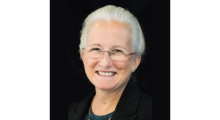
Fast, affordable Internet access for all.

It was only a year ago that Next Century Cities Executive Director Deb Socia received the Charles Benton Digital Equity Champion Award. Since then, Deb has continued to raise the bar for nonprofit leaders. She has brought people together, advocated for smart policies, and developed resources to help local communities improve connectivity and shrink the digital divide. Now, Deb has decided it’s time to share her high-energy magic in Tennessee. Deb recently announced that she has accepted a position as CEO of the Enterprise Center in Chattanooga.
The Heart and Soul of Next Century Cities
Since she started the organization in the fall of 2014, Deb has led its team and the member communities that collaborate and share information. The group began with a modest 32 members, but through Deb’s hard work and determination, more than 200 communities have now joined. The nonprofit, through her vision and leadership, has assisted local governments in their vision of better connectivity and local policies that encourage broadband investment.
 Before getting Next Century Cities off the ground, Deb was the Executive Director of the Tech Goes Home program whose mission is to ensure digital equity. Deb also spent 32 years as an educator and education administrator, a role that gave her many of the skills she has used to bring people together. Deb worked as the founding principal of the award winning Lilla G. Frederick Middle School, a Boston Public School where she led the one-to-one laptop initiative. She has received a many awards for her work in education and in helping local communities get their populations connected, including recognition as the NATOA Community Broadband Hero in 2013, the 2013 Pathfinder Award from MassCUE (Mass Computer Using Educators), and the 2010 Leadership and Vision award from CRSTE (Capitol Region Society for Technology in Education), the Google Digital Inclusion Champion Award, Motherboard Human of the Year, and an NTENny Award.
Before getting Next Century Cities off the ground, Deb was the Executive Director of the Tech Goes Home program whose mission is to ensure digital equity. Deb also spent 32 years as an educator and education administrator, a role that gave her many of the skills she has used to bring people together. Deb worked as the founding principal of the award winning Lilla G. Frederick Middle School, a Boston Public School where she led the one-to-one laptop initiative. She has received a many awards for her work in education and in helping local communities get their populations connected, including recognition as the NATOA Community Broadband Hero in 2013, the 2013 Pathfinder Award from MassCUE (Mass Computer Using Educators), and the 2010 Leadership and Vision award from CRSTE (Capitol Region Society for Technology in Education), the Google Digital Inclusion Champion Award, Motherboard Human of the Year, and an NTENny Award.
Deb has also earned undying respect and admiration from the people who know have worked with her, like those of us at the Institute who are also incredibly proud of her!
The Next Chapter
When she spoke with the Times Free Press about her upcoming transition to the new role, Deb said that she’s looking forward to working on connectivity issues at the community level ”where you can directly see those who are touched" by the results:
"I'm really pleased with the national work I've been able to do in working with cities across the country in recent years, but I'm ready for that opportunity to be back in the community where I can feel the impact of the work that we do as an organization."
She also described Chattanooga as a place where, in the past, she imagined herself one day. She begins at the Enterprise Center in July and they’re looking forward to her leadership with anticipation. According to Sydney Crisp and David Belitz, from the Enterprise Center, they chose Deb because she stood out from an already strong pool of candidates.
According to the organization's website:
The Enterprise Center is a non-profit organization with a local board of directors whose public-serving mission is to establish Chattanooga as a hub of innovation and improve people’s lives by leveraging the city’s digital technology to create, demonstrate, test and apply solutions for the 21st century.
Deb and her team will be charged with advancing three important strategic goals for Chattanooga:
 Read more about the organization’s goals, vision, and philosophy here.
Read more about the organization’s goals, vision, and philosophy here.
Looking for A Leader
Deb’s departure leaves Next Century City searching for a new captain. Replacing her will be challenging, but staff and leadership at the organization hope interest is strong. Deb has increased the presence of the nonprofit and made people aware of its value in connecting rural and urban communities. Broadband has transitioned from luxury to necessity, and a growing number of people have made it their mission to help connect everyone — one of those people will be the right fit for Next Century Cities.
Parting Words from the Policy Director
Having worked with Deb since the inception of Next Century Cities as the Policy Director, Christopher had these words to say about Deb’s departure:
Deb built Next Century Cities into what it is today - an organization that has quietly helped countless cities dramatically improve Internet access while also representing their interests in DC. Few could have accomplished what she did with such intelligence and grace. She will do very well at the Enterprise Center and we will miss her presence at Next Century Cities.
The Community Broadband Networks team here at the Institute for Local Self-Reliance will miss Deb, but we know that she will take the Enterprise Center to new heights and we wish her the best of fortune in her new leadership role.
Congrats, Deb!
Thanks to Chattanooga’s wildly successful municipal broadband network, EPB Fiber, and its partnership with The Enterprise Center and Hamilton County Schools, over 15,000 low-income students in 8,500 households in Hamilton County are already getting a decade of free high-speed Internet service at no cost through a program known as HCS EdConnect. We wanted to visually document the power the program has had in transforming the lives of participants by weaving together a compilation of video diaries that will give you a glimpse of how a visionary municipal network made this Tennessee county more resilient in the face of the pandemic and ensured no one in their community was left on the wrong side of the digital divide.
